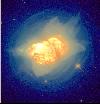


| THE INTEGRITY PAPERS | NUC Group | ceptualinstitute.com |



CANADIAN ASSOCIATION FOR THE CLUB OF ROME
******************************************
Literature notes on the Global Problematique by John McRuer9/12/97
Smil, Vaclav
GLOBAL POPULATION AND THE NITROGEN CYCLE
==================================================
Scientific American P:76 Jul-97Issue: nitrogen Cycle Region: Global Key: environm Sub-key: natural processes, biosphere
--------------------------------------------------------
Feeding humankind now demands so much nitrogen-based fertilizer that the distribution of the earth's nitrogen has been dramatically changed in sometimes dangerous ways.
==============================================================Because withdrawals caused by the growth of crops and various natural losses continuallyremove fixed nitrogen from the soil, that element is regularly in short supply. Traditional farmers replaced the nitrogen lost or taken up in harvests by enriching their fields with crop residues and animal and human wastes, by planting legumes, and by green manure. Places with good soil, adequate moisture and a mild climate should be able to support as many as 15 people per hectare by these methods. In practice, only about a third as many was achieved by these organic methods. This reduced efficiency resulted from pests, severe weather, and the need to raise non-food crops.
Traditional (19th century) farming faced a fundamental problem that was especially acute in land-scarce countries with no grazing land for agricultural expansion. The only way farmers could break the local nitrogen cycle and increase harvests was by planting more green manures. Rotation of staple crops with legumes was a more fitting choice but legumes have lower yields.
The real breakthrough came with the development of ammonia synthesis by Carl Bosch and Fritz Haber at the beginning of the 20th century.Now, one third of the protein nourishing humankind depends on synthetic fertilizer. Land scarce countries with high population density depend on synthetic fertilizer for their very existence, even if their diets contain little meat: China, Egypt, Indonesia, Bangladesh, Pakistan and the Philippines.
Massive introduction of nitrogen into soils and waters causes environmental problems ranging from local health to global changes, and extend from deep underground to high in the stratosphere. High nitrate levels in water can cause "blue baby" disease, and some cancers. A dangerous accumulation of nitrates is commonly found in wells in the American corn belt and western Europe. Concentrations exceeding legal limits occur not only in the many smaller streams draining farmed areas but also in such major rivers as the Mississippi and the Rhine. Fertilizer nitrogen causes eutrophication of lakes, estuaries, coral reefs and the Baltic Sea, leading to algae blooms [which can harbour cholera]. Nitrogen compounds also contribute to the acidification of soils.
An early stabilization of population and the universal adoption of largely vegetarian diets could curtail nitrogen needs, but neither is particularly likely. The best hope is in finding more efficient ways to
fertilize crops.Understanding these realities allows a clearer appraisal of the prospects of organic farming. It could not feed today's population. There isn't enough recyclable nitrogen to feed six billion people.
*****************************************************
The notes in this series are prepared by John McRuer and are offered as a
service to the public by the Canadian Association for the Club of Rome
(CACOR). Neither the notes nor Mr McRuer's comments represent official
CACOR policies or opinions and CACOR does not guarantee the accuracy with
which Mr McRuer may have captured the original material.
CACOR's web site is: HTTP://www.magi.com/~jrennieJohn D. McRuer B.S.C., M.E.S. / RR # 1 / Wellesley, Ontario, Canada / N0B 2T0
THE INTEGRITY PAPERS (LINKS TO CEPTUAL READINGS)
THE INTEGRITY PAPERS
GENRE WORKS (world writers)
CONVERSATIONS
DIALOGUES
MINDWAYS
POETICS
(about Integrity ideas)